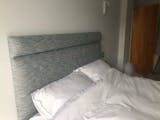Introduction
If you feel tired or lethargic during the day, then there’s a good chance that you aren’t getting enough sleep. Getting adequate sleep is essential for physical and mental health, but many people simply don't get enough of it. As a result, they may experience symptoms such as fatigue, stress or depression. Fortunately, there are many simple steps you can take to improve how much restful sleep you get every night and they don't require any fancy equipment or expensive treatments!
Keep digital distractions outside the bedroom
The first thing you need to do is ensure that your smartphone is not in the bedroom. It's easy to lose track of time when using a phone or tablet, especially if they're right next to you as you sleep. If this happens often enough, it can cause insomnia and make it harder for you to fall asleep at night. What’s more, the light from your phone screen keeps your brain active, making it difficult to fall asleep. So do yourself a favour and keep your digital devices out of the bedroom if you can.
Consider what music you listen to before sleeping
You might think that listening to music before going to sleep is a bad idea, but actually, it's quite the opposite. Music can help you relax and fall asleep faster, stay asleep longer and wake up more easily.
If you listen to calming music with gentle rhythms, like classical or ambient sounds, then this will help calm your mind so that it doesn't race with thoughts about work or other stresses during the day. If this happens regularly then it could be affecting how well you sleep at night time too!
Invest in a comfortable mattress and pillows for better sleep quality
The best mattress is one that is comfortable and supportive. The best pillow is one that supports your head and neck, so it's important to find a good fit for you. If you're having trouble sleeping because of pain or discomfort, try investing in a new mattress or pillows. You can also buy a mattress topper if you're on the hunt for better sleep quality!
People often overlook mattresses as a culprit for a poor night’s sleep, but in reality, an old or uncomfortable mattress is one of the leading causes of unrestful sleep. A mattress lasts for around 7 to 10 years, so if yours is older than this, it might be time to invest in a new one.

Product: Pemberley Pillow Top Mattress
Start winding down an hour before bed
Start winding down an hour before bed. You can do this in a few different ways, such as avoiding stressful activities as you wind down for sleep. If you're having trouble falling asleep, avoid any stressful or emotional situations that might keep you up at night. This includes watching a scary movie or reading a book that is distressing or filled with action.
Avoid caffeine and alcohol during the evening hours, too. Caffeine can stay in your system for up to 12 hours after ingestion, so if you drink coffee or tea after lunchtime it could prevent sleep until late into the night (or early morning).
Try to eat lighter meals earlier in the day rather than heavy ones closer towards evening time, as this will give digestion time needed before going to bed so food digests properly instead of causing discomfort when lying down.
Avoid naps during the day
While naps can be a great way to recharge your batteries, they can also make it more difficult for you to fall asleep at night. If you take a nap after lunch and then go to bed at 9 p.m., your circadian rhythm will still have another four hours before it's time for bedtime. This can cause grogginess and fatigue during the day, as well as disrupt your sleep cycle later on in the evening.
Naps are not nearly as restorative as night-time sleep because they don't provide the same amount of deep REM sleep needed to maintain mental health and physical vitality. They also disrupt circadian rhythms by delaying melatonin release, which makes falling asleep easier, and increase cortisol levels (the stress hormone).
Keep your room dark and cool during sleep hours
Keep your bedroom cool so that it’s comfortable for you to fall asleep. As long as you're comfortable, it's best to keep your room at a temperature that feels neither too hot nor too cold.
You should also keep your room as dark as possible when falling asleep. You can do this by investing in thick curtains, blackout blinds or even a sleep mask if necessary. If there are lights coming in through windows or street lights shining through your blinds, consider using an eye mask to block them out--this will help you fall asleep faster and get better quality rest overall.
Take a hot shower or bath before bedtime to relax your muscles and quiet your mind
A hot shower or bath will help relax your muscles, which can make it easier to fall asleep. It's also been shown to lower body temperature, which may help regulate sleep cycles by slowing down the metabolism and lowering body temperature. In addition, taking a warm bath before bedtime has been shown in studies to reduce stress levels and improve moods, two things that can contribute to better sleep quality!
Conclusion
In the end, there's no one-size-fits-all solution for getting a good night's sleep. But by making some simple changes to your routine and environment, you can help yourself get to bed earlier and wake up feeling more refreshed than ever before.
If you’re looking to get to bed earlier, one of the best ways to encourage this is by treating yourself to a high-quality bed. If you’re interested in getting a new bed or mattress, please contact our team at Endurance Beds today.







